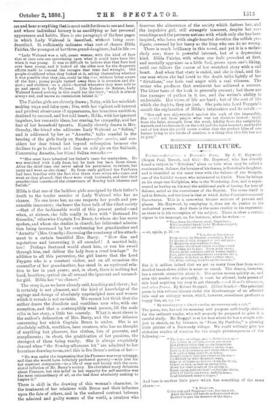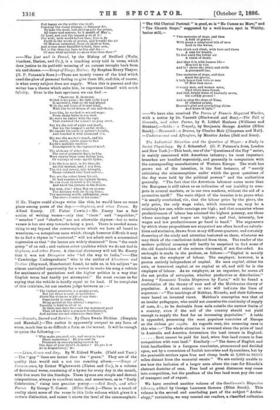CURRENT LITERATURE.
POETRY.—.41il i±!s : a Dimmatic Poem. By J. C. Heywood.
(Megan Paul, Trench, and Co.)—Mr. Heywood, who has already found a subject in " Herodias," gives us here what may be called a continuation. Salome, the heroine of his drama, is Herodias's daughter, and is identified at the same time with the Salome of the Gospels, one of the faithful women who ministered to Christ. Then he brings on his stage one Kaliphilaa, who is the Wandering Jew, and is repre- sented as having on his soul the additional guilt of having, for love of Salome, acted as the executioner of the Baptist. The scene itself is laid in Britain, and the time is that at which Aulus Bautius conquered Caractacus. This is a somewhat bizarre mixture of persons and places. Mr. Heywood, by employing it, does not do justice to his undoubted powers. And there is the same crudity in his expression as there is in his conception of his subject. There is often a certain vigour in his language, as, for instance, when he writes :— " non from the thorny scrub, Experience,
With lacerated hands haist Wisdom croppe3, But countedit not thy fruits."
—or, again, p. 31 :—
" Yea, far as love can go. From where, by Phoebus overtakes, Nigut In blushes hided', stripped of veil and gems, To Hesperus, who readorneth her, His amber shield and zenith.reaelling sword Forbidding me to pass. From polar snow=, Where, in the voiceless cold of winter night., Pale, phantom conflagrations sweep the skies, To where, with feet on &fries either shine, 01,1 Atlas. sighing, holdeth up the heavens."
But it is seldom indeed that we get as many lines free from some decided break-down either in sense or sound. The drama, however, has a certain attraction about it. The action moves quickly on, and stirs the reader, who generally, it must be allowed, finds poems of this kind anything but easy to get through.—A Heart's Obsession, and other Poems. By Robert Steggall. (Elliot Stock.)—The principal poem in this volume labours under the disadvantage of an affected title and an unhappy metre, which, however, sometimes produces a happy line, as, e.g.:- ' My morning prays r almait a psalm, my evensong only a sigh."
The poem, too, has not its meaning and purpose sufficiently obvious for the ordinary reader, who will scarcely be prepared to give it a careful study. Mr. Steggall is at his best where he has a simple sub• ject to sketch, as, for instance, in " From My Portfolio," a pleasing little picture of a Normandy village. We could willingly give his elaborate studies of emotion for the simple picturesqueness of the following :— "A SPartrow.
Little cock puff Pepys-sparrow, free-born sit, Amid the dear old haunts and cnstomed ways Content to pass the measure of thy days; "The town—a village, save is flattering Lies hidden at fur feet, except yon sp irse And glowing villas that so sun themselves The livelong summer halfway up the slope, Each in its pleasaunce, and above whase base Soft curls a filmy azure from below. Naught higher, save you chapel at the top — Up whither by what desultory ways, Some as at timorous distance from the brink, Others so near, as bent on gazing o'er, Down the sheer strata of the preeipi-e, Those zigzag patliiets lead l—a toy-like shrine, Albeit to hearts sea-weary, wafting home, Glad landmark many a longue."
And here is another little piece which has something of the same charm :—
Fall happy on the getter rim to sit, Preening thy dusky plumes, er frequent flit, To take the meal, and chi. rep give for praise, All times and seasons, be it month of May's, Or Lent, and just the leanest port of it ! The wide, wide world before thee, free to fly Forth to the wends or groves, and breathe the air Of Heaven untainted, feast on daintier fare, And scenes more beautiful behold, than now,
Yet is thy chocking here to live and die;—
Of men what myriads no more wise than thou!"
—Was Lost ani is Found, by the Bishop of Bedford (Wells, Gardner, Marton, and Co.), is a touching story told in verse, which does justice to its pathetic meaning of an conked brought back from sin and shame.—Songs of Sleepy Hollow. By Stephen Henry Thayer. (G. P. Putnam's Sons.)—These are mostly verses of the kind which need the glow of personal feeling to give them life, and this, of course, is what every subject does not supply. When this is present and the writer has a theme which snits him, he expresses himself with much felicity. Here is the best specimen we can find :— " SANFORD R. GIFFORD.
Stilled is his pulse; his deft rirht hand Is nerveless, that so eft had played With the soft tints of Orient-land, With the weird dream of sun and Shade.
Love-like, he worked in wizard ways: From dying halos in the west He wove an amber with the rays That crowned the ocean's en, ging crest.
Not his the veil of night and death, Nor his the tempest's anted strife ; He caught the smile in nature's breath, And touched it with illumined His was the master's touch, and his The secret, subtle sense to find Earth's mutable realities Transfigured in the raptured mind.
The alchemy of ether-fire, The seven prismatic hues, to him Were strains from some Eolian lyre, Or voicings of some mystic hymn.
Ulm the true poet, in his thouiht An idyl dawned, and, f mt:y free, The virii ned revery, inly wrought, Shone outward over land and Eel.
For, ere the colors knew his art, Or had expressed his lightest theme, He saw them blended in his heart, And knew the picture in the dream.
lint now, alas! when Nature crowns The Autumn with its dying flame, The mourning world, unfeigning, owns The star, el lustre of his uame."
If Mr. Thayer could always write like this, he would have no mean place among poets of the day.—Orpheus, and other Poems. By Alfred Emery. (T. Fisher Unwin.)—Mr. Emery has a fair notion of writing verses—only that " there " and " sepulchre," " meadow " and "shadow," are not allowable rhymes—but to write verses is but one step towards being a poet. There is needed some- thing to say beyond the commonplaces which we have all heard to weariness,—s scrupulous taste which, though however difficult it may be to find a rhyme to " scattered," will not admit such a nonsensical expression as that "the leaves are widely shattered" from "the weak grasp " of an oak ; and various other qualities which we do not find in Orpheus, and other Poems. A classical dictionary will tell Ur. Emery that it was not Dionysius who "led the way to India."—The "Cambridge Undergraduate" who is the author of Khartoum and Thither (Heywood, Manchester) found, he tells us, in his subject " an almost unrivalled opportunity for a writer to make his song a vehicle for sentiments of patriotism and the higher politics in a way that English verse had hardly yet attempted." He must excuse us for saying that the vehicle is hardly equal to its load. If he complains of this criticism, let our readers judge between us :- " The highest greatness is a people great, But yet there is auot er excellence Above the via tetras mght of auy state : Sepal iority is some offence,
Being gained at the inferior's expensy ; Equality is kind to all of us In these last days we count the statement good That all men have a common brotherhood, And nations are not otherwise than thus."
—Sonnets, Sacred and Secular-. By Clara Swain Diclx-ins. (Simpkin and Marshall.)—The author is apparently unequal to any form of verse, much less to so difficult a form as the sonnet. It will be enough to quote the following :- " Why make you such ado, and weep to know
Short separation ? Do you ever lie Prostrate in overwhelming sorrow by The door of your child's chamber ? Do you beer As in despondency," dm.
—Lines, Grave and Gay. By W. Eldred Warde. (Field and Tiler.) —The " gay " lines are better than the " grave." They are of the quality that would suit a not too exacting album.—Songs of Perseverance, by Esther Wigleeworth (Nisbet and Co.), is a volume of devotional verse, consisting of a hymn for every day in the month, with five more for the Sundays. These hymns are simple and devout compositions, always in excellent taste, and sometimes, as in " Early Celebration," rising into genuine poetry.—Red Roofs, and other Poems. By George T. Coster. (Elliot Stock.)—There is a touch of reality about some of the verse in this little volume which gives it a certain distinction, and raises it above the level of the commonplace.
" The Old Clerical Portrait " is good, so is "He Comes no More," and "The Church Steps," suggested by a well-known spot in Whitby, better still,—
" Two centuries of stops, and then A field of graves !
With many a sculptured tale of men
Lost in the waves.
You climb and climb, with here and there
A seat for breath,
To find amid the loftier air A realm of death.
And thus it is with human Wo- men toil to rise.
And lo ! above the strain and strife A graveyard lies.
Two centuries of steps, and then Amid the graves, A holy house that tells to men Of Him that saves.
0 weary men, and women worn, That there have found,
And find, bright hints of heavenly morn.
On earthly ground !
And so atop the steps of Time, If climbed aright, Heaven's glad and everlasting chime And home of light."
—We have also received The Poems of Francis Heywood Warder, with a notice by Dr. Vanroth (Blackwood and Son).—Ths Fall of Granada, and other Poems, by Et Liddell Mathers (Williams and Strahan).—Selda : a Tragedy, by Benjamin George Ambler (Elliot Stock).—Tecumseh: a Drama, by Charles Moir (Chapman and Hall). —Undercurrent and Afterglow, by Maurice Arden (Bell and Sons).



































 Previous page
Previous page